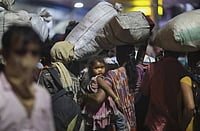Economist Pronab Sen says the assessment of the world economy plunging into depression is flawed as the current crisis is an exogenous shock. In an interview with OutlookâÂÂs Rajat Mishra, Sen, who is currently the Country Director, India Programme of the International Growth Centre, says India should lift nationwide lockdown in a phased manner so that it helps in generating production and consumption. Excerpts:
Would it be correct to say that Coronavirus is putting the world on the path to Great Depression?
First, let's be clear about the use of terms. We have to understand how the Great Depression really arose -- from a fundamental misunderstanding of how economic system works. But now we have a fairly good idea about what should be done. The world will certainly go into a recession. But whether we go into a depression, that needs to be seen. Technically, a recession is two consecutive quarters of negative growth and a depression is four quarters of negative growth. So, now, the whole problem is that how long will this situation continue, and this depends on the time spent to contain the pandemic.
WTO said that Coronavirus is putting the world on the track of Great Depression. Do you think that this assessment is flawed?
Yes, I do think it is flawed. We may technically slip into depression, but it will not be a depression as we understand it because the depression arises from a sort of internal logic of the economic system. Now, here the internal logic of the economic system is not coming. This is an exogenous shock. And the shock is having the repercussions on both production and consumption. But these are not endogenous.
What would be the consequences of this nationwide lockdown on the Indian economy in the long run?
As I said, in such situations, almost everything depends upon how quickly and appropriately the government intervenes. If you look at current situation when the entire country is under lockdown, demand stimulus will not work. For the very simple reason, a demand stimulus works only when there is a supply response to the demand. It all depends on the duration of the lockdown.
Also, we must accept that government does not have the administrative reach to address around 64 million enterprises that exist in this country. What the government should be doing is really putting the responsibility on the financial sector. The first step in this direction was taken with the RBI announcements, which, in my opinion, did not go far enough. Then comes the stage at which production restarts. At that stage, what will happen if these companies have already borrowed up to the working capital limit? Now, when the companies start production again, they will require additional working capital again. And if they donâÂÂt get additional working capital, we will be back to square one. So, the government should ensure that there should not be shortage of capital for the companies to start production.
Once the lockdown is lifted and the production cycle comes into play, then only the fiscal stimulus is going to work.
How do you see the lockdown lifting in the future?
The lockdown should be lifted in a phased manner. The advantage of easing restrictions in a phased manner is that you are allowing the system to come back to normal gradually. It is better to have this process move sequentially. So, you first have production that generate income, income, and then generate consumption.






















.jpg?w=200&auto=format%2Ccompress&fit=max)



